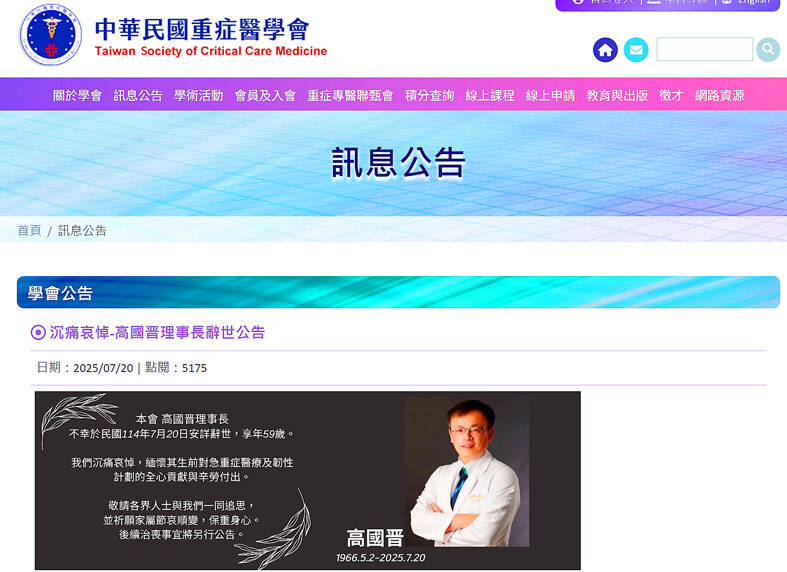The Centers for Disease Control (CDC) yesterday expressed its sorrow over the death of pulmonologist Kao Kuo-chin (高國晉), hailing his dedication to medicine, including helping establish national clinical treatment guidelines for COVID-19.
The Taiwan Society of Critical Care Medicine on Sunday wrote on Facebook that Kao, the association’s chairman, had passed away at the age of 59.
The society said its members express their deepest condolences, and would remember his wholehearted contribution and hard work in the field of emergency and critical care medicine, as well as in a resilience project.

Photo: Screengrab from the Internet
Chang Gung Memorial Hospital, where Kao was the head of the Department of Respiratory Therapy, confirmed his death on Sunday evening.
Chou Chia-yu (周嘉裕), a former head of Taipei Veterans General Hospital’s Department of Critical Care Medicine, on Sunday wrote on Facebook that he had learned that his friend Kao was found unconscious with no heartbeat in his office at Linkou Chang Gung Memorial Hospital on Sunday afternoon.
The CDC yesterday said their staff members were shocked by the news about Kao, a highly respected and valuable partner of the CDC in disease prevention.
Minister of Health and Welfare Chiu Tai-yuan (邱泰源) and CDC Director-General Chuang Jen-hsiang (莊人祥), on behalf of all disease prevention personnel, expressed their boundless grief as well as gratitude to Kao’s professional dedication, benevolence and contributions in protecting people’s health, the CDC said.
From January 2020 to May 2023, Kao was a member of the specialists’ meeting of the then-Central Epidemic Command Center (CECC) for COVID-19, engaging in planning COVID-19 prevention policies and decisions, it said.
He provided suggestions and scientific evidence for setting the criteria for reporting cases, border control strategies, and the contingency plans for domestic testing and medical capacity preparation in the early stages of the pandemic, it said.
After local COVID-19 activity rapidly increased in May 2021, the CECC quickly set up a “COVID-19 severe cases clinical treatment experts’ advisory group,” with Kao again stepping forward to become an advisory committee member, it said, adding that he shared his vast experience, offered practical suggestions and gave online lectures.
The CDC said the content of his lectures were later compiled into a key documentary of severe COVID-19 medical care, an important reference for the field of critical care medicine in Taiwan.
Kao also participated in establishing the nation’s clinical treatment guidelines for COVID-19, as well as other important guidelines, and has made invaluable contributions to improving medical care quality for treating severe COVID-19, it said.

The Coast Guard Administration (CGA) yesterday said it had deployed patrol vessels to expel a China Coast Guard ship and a Chinese fishing boat near Pratas Island (Dongsha Island, 東沙群島) in the South China Sea. The China Coast Guard vessel was 28 nautical miles (52km) northeast of Pratas at 6:15am on Thursday, approaching the island’s restricted waters, which extend 24 nautical miles from its shoreline, the CGA’s Dongsha-Nansha Branch said in a statement. The Tainan, a 2,000-tonne cutter, was deployed by the CGA to shadow the Chinese ship, which left the area at 2:39pm on Friday, the statement said. At 6:31pm on Friday,

The Chinese People’s Liberation Army Navy’s (PLAN) third aircraft carrier, the Fujian, would pose a steep challenge to Taiwan’s ability to defend itself against a full-scale invasion, a defense expert said yesterday. Institute of National Defense and Security Research analyst Chieh Chung (揭仲) made the comment hours after the PLAN confirmed the carrier recently passed through the Taiwan Strait to conduct “scientific research tests and training missions” in the South China Sea. China has two carriers in operation — the Liaoning and the Shandong — with the Fujian undergoing sea trials. Although the PLAN needs time to train the Fujian’s air wing and

The American Institute in Taiwan (AIT) put Taiwan in danger, Ma Ying-jeou Foundation director Hsiao Hsu-tsen (蕭旭岑) said yesterday, hours after the de facto US embassy said that Beijing had misinterpreted World War II-era documents to isolate Taiwan. The AIT’s comments harmed the Republic of China’s (ROC) national interests and contradicted a part of the “six assurances” stipulating that the US would not change its official position on Taiwan’s sovereignty, Hsiao said. The “six assurances,” which were given by then-US president Ronald Reagan to Taiwan in 1982, say that Washington would not set a date for ending arm sales to Taiwan, consult

A Taiwanese academic yesterday said that Chinese Ambassador to Denmark Wang Xuefeng (王雪峰) disrespected Denmark and Japan when he earlier this year allegedly asked Japan’s embassy to make Taiwan’s representatives leave an event in Copenhagen. The Danish-language Berlingske on Sunday reported the incident in an article with the headline “The emperor’s birthday ended in drama in Copenhagen: More conflict may be on the way between Denmark and China.” It said that on Feb. 26, the Japanese embassy in Denmark held an event for Japanese Emperor Naruhito’s birthday, with about 200 guests in attendance, including representatives from Taiwan. After addressing the Japanese hosts, Wang